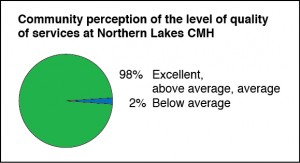 Northern Lakes CMH has conducted a survey of the community every other year to assess attitudes and awareness levels of community members concerning Northern Lakes CMH as well as about mental health and disability issues.
Northern Lakes CMH has conducted a survey of the community every other year to assess attitudes and awareness levels of community members concerning Northern Lakes CMH as well as about mental health and disability issues.
Some of the responses are exactly what one would expect and give credence to the results overall. For example, people who personally know someone who has received treatment for a mental illness or developmental disability are more likely to be aware of Northern Lakes and know who to call if they knew a child experiencing a mental health crisis. Conversely, people who do not personally know someone with a mental illness or developmental disability tend to be not at all aware of Northern Lakes and do not know who to call for a child in crisis.
Positively, the survey indicates an increase in awareness of Northern Lakes CMH, with a 5% decrease in those “Not at All Aware” and a 5% increase in those “Very Aware,” since 2010. At the same time, the perception of the quality of services at Northern Lakes has also increased, with 55% rating Northern Lakes CMH services as Excellent or Above Average, compared to 53% in 2010. Likewise, ratings of below average or poor dropped in 2013. In 2010, 6.4% rated Northern Lakes services as below average or poor; in 2013, this percentage dropped to 2.3% as below average and 0% as poor.
The survey indicates we continue to have a very supportive community but a slight slippage overall has occurred in respondents’ belief in recovery and community treatment, with a slight increase in stigma-related attitudes. For example, in 2010, 90% agreed that treatment in the community, instead of in an institution, is good, compared to 86% in 2013. In 2010, 95% believed that treatment can help people with mental illness lead normal lives, compared to 88% in 2013. While national and state data are not available for 2013, one may speculate that the number of national tragedies involving mass shootings in the media during 2013 contributed to this change in attitudes, with a lessening strength in belief in recovery overall. (In addition, just prior to and during the week the telephone survey was conducted, there was media coverage of a local incident.)
We believe that anti-stigma and community education initiatives are more important now than ever and the practical implications are that the organization should increase focus on these issues as resources allow.
To learn more, view the documents below:
2013 Telephone Survey – Executive Summary
2013 Telephone Survey – Full Report
2013 Telephone Survey – PowerPoint Presentation
